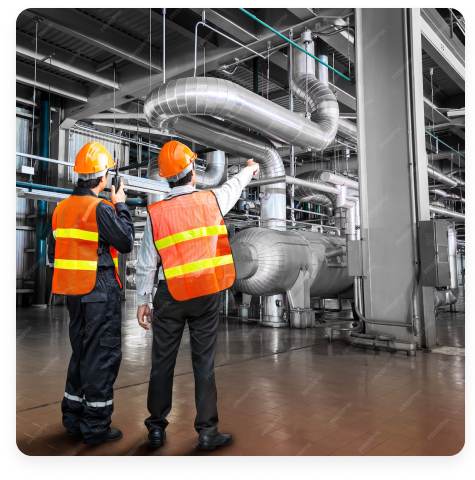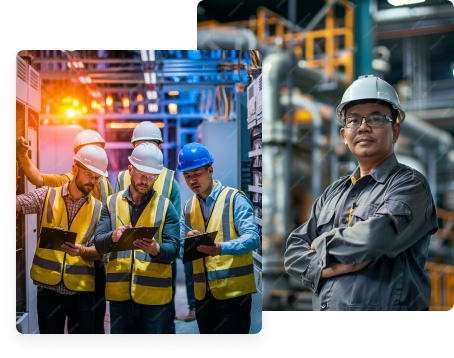ASME B31.3 - Process Piping Code Design Requirements
ASME B31.3 course on process piping covers design to testing. This 5-day training is offered in Malaysia and Indonesia
Level
Intermediate
Type
Facetoface

Trusted by Leading Companies
Our training programs are promoted to engineers, supervisors, and technical teams across the globe, supporting their continuous development and operational competency.












About Training
Training Objectives
What is ASME B31.3 training course objective?
- Familiarize participants with the organization and intent of the B 31.3 code
- Know how to read the code, and interpret its stated and implied requirements
- What issues to take into consideration when designing process piping
- Pressure design of piping and piping components
- How to analyze piping flexibility and gauge the limitations of piping and piping components
- Provide participants step-by-step approach to piping design, including the design optimization techniques.
- Introduce participants to various material selection, fabrication, erection, and testing of piping systems.
- Be able to understand the mandatory requirements, specific prohibitions, and optional stipulations given in the code and other service restrictions on Piping systems.
- How to conduct and certify the pressure testing.
- Understand principles of piping integrity assessments as per API 570 and make run-repair-replace decisions.
- Know how to calculate the Remaining life and MAWP of the piping system
Audiences
Who should join ASME B31.3 training course by PetroSync?
Instructor
MM
Mandar Mulay
Mandar Mulay has about 20 years hands on experience in design and integrity assessment of Piping Systems, Reactors & Storage Tanks, Pressure Vessels, Power Boiler, and Heat Exchanger. He is well conversant with the major industry codes & standards such as ASME Sec. I, ASME B 31.1, B31.3 , B31.4 and B31.8, ASME Sec VIII, BS-5500, TEMA, API -650, IS 803, API 579, ASME PCC-2 etc.
Major projects closely associated with, in his professional career so far are, Qatar Chemicals, Shell, Castrol India, Reliance Industries, Cargill Foods USA, etc. His proficiency in Power Boiler, Piping and Pressure Vessel Codes enables him to trace the similarities and differences of these codes. He also actively involved as Instructor for programs on the subjects of ASME codes, Integrity Assessment, Fitness for Service, etc.
Along with his career in Engineering and Design Department in a multinational company at a very senior post for the last 20 years, he is also visiting faculty to a well known Engineering College in India for their P.G. Courses in Piping Design and Engineering
Apart from being visiting faculty, He has also conducted several Training Courses ( ASME Sec. I, ASME Sec. VIII, ASME B 31.3 Piping Codes , API 579 FFS code, ASME PCC-2 Repair practices, and Heat Exchanger Design Operations & Maintenance ) in Saudi Arabia, Qatar, Bahrain and UAE for engineers from companies like Saudi Aramco, SABIC group of Companies, Qatar Petroleum, ADNOC, BAPCO, DEWA, Gulf Petrochemicals etc. He has already conducted many times the training courses in API 579, where the participants rated him “Excellent” for these courses.
Daily Aims
- Objectives and intent of ASME B 31.3 Code
- ASME B 31.3 Scope and applicability
- Understanding of the Codes, what means SHALL, SHOULD & MAY in Code
- Code contents, Stated & implied stipulations in the Code
- What are design conditions, design pressure & design temperature
- What are various fluid services generally encountered
- Definitions of Category D, M, U, Normal and High Pressure Services
- Concept of Weld Strength reduction factor
- Weld Quality factor
- Allowable stresses and the basis for its calculations
- Design of piping components for internal pressure
- Design of piping components for External pressures.
- Design of branch connections –reinforcements
- Selection of Flanges
- Design of pipe fittings such as elbows, tees and blanks
- Service considerations in Design
- Flexibility considerations
- Case studies in flexibility calculations
- Methods to incorporate flexibility in Piping systems
- U - loops, Expansion Joints
- Extensive case studies on Piping Design
- Piping Span Calculations
- Selection of Supports and Hangers
- Material Identification, Certification and Traceability
- Code accepted Materials and material testing
- Listed, unlisted materials
- General requirements to be checked before selection of Material
- Limitations imposed by code on materials
- Impact testing requirements
- Acceptance Criteria as per ASME B 31.3
- Design interface with Fabrication, Assembly and Erection
- Code requirement for preheating and PWHT
- Design interface with Inspection, Examination and Testing
- How to Conduct and certify pressure testing.
- Hydrostatic testing of piping system
- Pneumatic testing of piping system
- Service leak test
- NDT in lieu of leak test
- Case studies
- Additional Code requirements for special fluids services
- Specific Design Requirements for Toxic Fluid (M Category) services
- Design Requirements for High Pressure Fluid services
- Design Requirements for High Purity (U category) Fluid services
- Design Requirements for High Pressure ( Category K) Fluid services
- Overview of flanges as per ASME B 16.5
- Piping integrity assessments as per API 570
- Making run-repair-replace decisions.
- Calculation of Remaining life and MAWP of piping system
- Real-world examples and case studies
Training Schedule
| Code | Start Date | End Date | Locations | Cost | Instructor |
|---|---|---|---|---|---|
| PST0270-202601 | 09 Feb, 2026 | 13 Feb, 2026 | Kuala Lumpur, Malaysia | USD 3350 | Mandar Mulay |
| PST0270-202602 | 04 May, 2026 | 08 May, 2026 | Bandung, Indonesia | USD 3350 | Mandar Mulay |
| PST0270-202603 | 06 Jul, 2026 | 10 Jul, 2026 | Bandung, Indonesia | USD 3350 | Mandar Mulay |
| PST0270-202604 | 23 Nov, 2026 | 27 Nov, 2026 | Kuala Lumpur, Malaysia | USD 3350 | Mandar Mulay |
Why Choose This Training
Credibility
Align with API/ASME standards. Trusted by major operators.
Expert Instructors
Led by industry veterans with real field experience.
Real Case Studies
Practical application of concepts through real world scenarios.
Practical Skills
Hands on calculations and decision making for FFS outcomes.
Trusted by Operators
Delivered to Aramco, ADNOC, SABIC, and other major operators.
Global Training Standard
Recognized across major industries by PetroSync's proven approach.
Professional Training Aligned with Industry Standards
Practical, industry ready training designed for real work environments
Limited seats available

Frequently Asked Questions
-
Direct Transfer
PetroSync Global Pte Ltd Bank Details:
- Account Name: PetroSync Global Pte Ltd
- Bank Name: DBS Bank Ltd
- Bank Code: 7171
- Bank Swift Code: DBSSSGSGXXX
- Branch Code: 288
- Account No: 0288-002682-01-6-022 (USD)
- Bank Address: 12 Marina Boulevard, Level 3, Marina Bay Financial Centre Tower 3, Singapore 018982
-
Terms & Conditions:
- For payment via direct telegraphic transfer, clients must bear both local and overseas bank charges.
-
Credit Card:
Terms & Conditions:
- A 4% credit card processing fee applies for credit card payments.
- Delegates who cancel after the training has been officially confirmed via email are required to pay the full course fee, and no refunds will be granted. However, you may substitute delegates at any time as long as reasonable advance notice is given to PetroSync.
- If PetroSync cancels, postpones, changes the trainer, or alters the training location (classroom/virtual) for any reason, and the delegate is unable or unwilling to attend on the rescheduled date, a 100% credit voucher of the paid contract fee will be issued. This credit voucher can be used for another PetroSync training program, subject to mutual agreement, within one year from the postponement date.
- PetroSync is not responsible for any loss or damage resulting from the cancellation policy and assumes no liability if the event is canceled, rescheduled, or postponed due to force majeure (e.g., natural disasters, war, government actions, industrial actions).
If PetroSync cancels, postpones, changes the trainer, or alters the training location (classroom/virtual) for any reason, and the delegate is unable or unwilling to attend on the rescheduled date, a 100% credit voucher of the paid contract fee will be issued. This credit voucher can be used for another PetroSync training program, subject to mutual agreement, within one year from the postponement date.
Yes, participants who complete the training will receive either an attendance certificate or a completion certificate, depending on the course requirements.
Yes, PetroSync courses adhere to international standards , with expert instructors in fields such as API, ASME, Reliability, and Drilling & Well Engineering.
Yes, PetroSync certificates are widely recognized and can be used to fulfill professional development and certification requirements across various industries.
Yes, PetroSync offers customized training programs tailored to your organization's specific needs (In-house Training).
Participants will receive comprehensive training materials , including slides, handouts, and direct learning from experts with case studies related to the training topic.
PetroSync trainers are industry experts with extensive experience as instructors and consultants in their respective fields, providing professional training with a strong background in the industry.
Yes, trainer profiles, including their qualifications, experience, and expertise, are available on the website: https://www.petrosync.com/training/.
Online training sessions are conducted via user-friendly platforms such as Zoom Premium.
To access PetroSync Online Training, participants need:
- A computer or laptop (tablets or smartphones are not recommended)
- A reliable broadband internet connection (minimum 4 Mbps)
- A webcam and a headset
- Any internet browser (Chrome browser recommended for a better experience)
- A reasonably quiet place
Yes, PetroSync provides live Q&A sessions with instructors to address real-world challenges encountered during training.
The average number of participants varies depending on the topic and participants’ schedules.
- The information you provide will be safeguarded by PetroSync and may be used to keep you informed of relevant products and services.
- As an international group, we may transfer your data globally for the purposes indicated above.
- If you do not wish to share your information with other reputable companies, please tick the box on the registration form.
Please fill out the form on the designated page first. Our team will reach out to you within a maximum of 2x24 hours.
The latest training schedule is available on the website: https://www.petrosync.com/training/.
